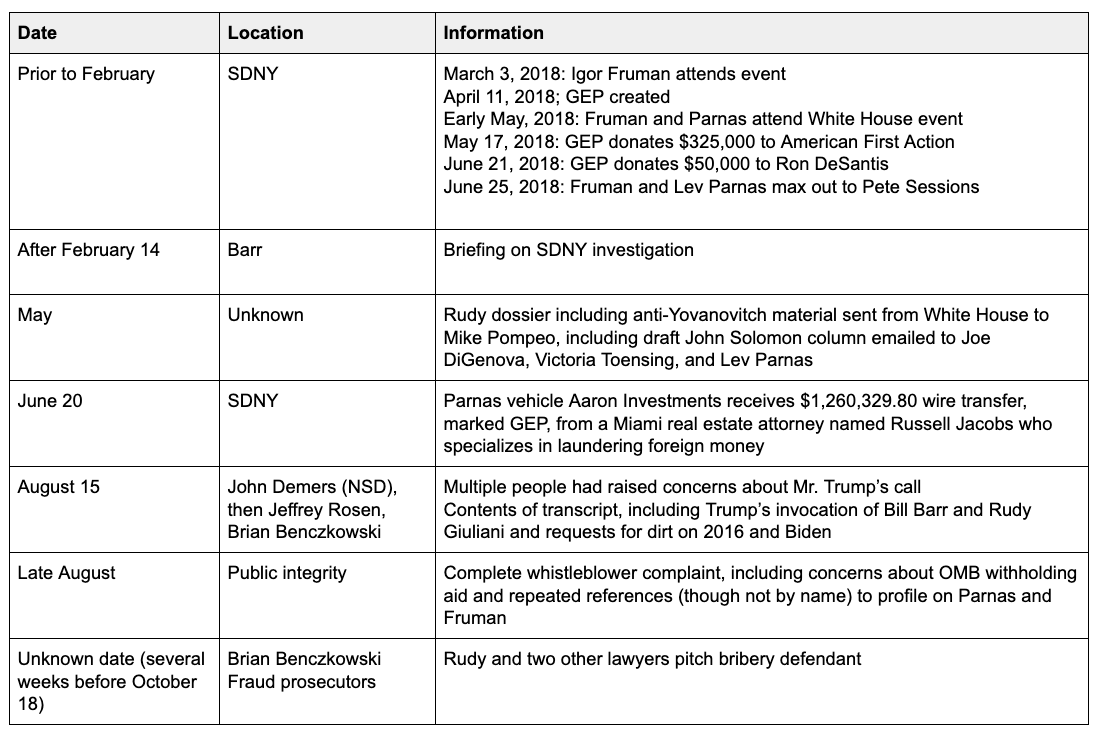Three Things: Fire, Fire, Fired [UPDATE-1]
[NB: Check the byline, thanks. Updates will appear at the bottom of this post. /~Rayne]
Bet you’ll guess only one of the three people our country needs to have removed from their position and replaced immediately.
Oops, there’s four, but let’s call it a two-fer.
But these people can’t be fired by the president, one might say.
If the Supreme Court said the president can fire the head of the Consumer Financial Protection Board according to its decision in Seila Law v. CFPB — Article II, Section 1’s vesting clause assures the president can remove those who assist him in execution of his duties — the president can likewise fire the heads of other executive branch functions.
Do it, Joe Biden. Get this done. Deliver for the people.
~ 3 ~
Fire U.S. Postmaster General Louis DeJoy — right the fuck now.
And fire along with him whomever it is on the USPS Board of Governors who has been bottlenecking his removal, which is likely governor chairman Ron Bloom.
DeJoy is hurting retired and disabled Americans who can no longer rely on getting their essential medicines on a timely basis. With some diabetics in particular already rationing their overpriced medicines, the mounting unnecessary delays caused by changes DeJoy implemented with the Board of Governors’ consent are causing injury. Lawmakers have tried to intervene on behalf of veterans whose medicines are mailed by the Veterans Administration, but without improvements to vets and non-vets alike.
It’s only a matter of time before we hear of some American who died as a result of USPS delays.
DeJoy is hurting businesses, particularly small business owners; they can’t rely on getting a First Class letter containing a payment from across town within a week, nor can their workers or contractors who are paid by check get their payments on a timely basis because of DeJoy’s unnecessary changes to USPS service. There have been losses which can’t simply be fixed by a replacement shipment — like dead chicks.
DeJoy’s changes to USPS aren’t saving Americans money; they’re costing them more and they can’t see this expense in their taxes where it’s concrete. It’s leaking away in disruptions to business and in injury to their vital personal needs.
We can’t tell how much of the manifold supply chain crises we’re experiencing is really DeJoy’s gross mismanagement of postal deliveries, even though DeJoy made the USPS prioritize package deliveries over First Class mail. Wrong move when business’s liquidity may be in that First Class mail.
The USPS has gotten so bad it now has its own Wikipedia entry for U.S. Postal Service Crisis.
Meanwhile, DeJoy continues to hold his current job in spite of documented and mismanaged conflicts of interest, including the purchase of $305,000 of bonds from Ron Bloom’s investment company.
The American public can’t afford to wait for any current investigations into his corruption to be completed.
DeJoy needs to go and take his corruption and lousy management with him. It’s not like he’s counting on the postmaster gig for a living while millions of Americans count on the USPS for their daily needs.
Don’t forget to take Trump-appointee Bloom, too. He’s likely been the reason the Board of Governors hasn’t removed DeJoy already since Biden appointees were named to the board.
How much longer are we going to have to yell about this particular Trumpian mess?
~ 2 ~
Fire the head of the Federal Election Commission Shana Broussard.
Broussard, a Trump-appointed Democrat (which should make one immediately skeptical), voted with the three GOP members of the FEC to dismiss a complaint that a foreign company Sandfire Resources donated $270,000 to a ballot initiative, Stop I-186 to Protect Mining and Jobs, in Montana to further its mining interests.
You’d think Broussard would have relied on the opinion of another Democratic FEC commissioner, Ellen Weintraub, to make her decision but no. Weintraub published a dissent which essentially begs Congress and state legislatures to ensure U.S. democracy is protected by regulations “preventing foreign influence over the U.S. political process.”
You’d also think Broussard as a Democrat would have some grasp of what’s at stake after the influence of foreign money on the 2012-2016 elections though laundered legally thanks to Citizens United — but no.
Further, you’d think Broussard would understand the GOP doesn’t lockstep with the three GOP FEC commissioners as to foreign influence. Evidence of this bipartisan concern appears in H.R. 5841 – the Stop Foreign Funds in Elections Act submitted on November 3 and forwarded to the House Committee on House Administration.
But no, Broussard is out of touch with what is needed to protect U.S. elections and simply not up to the job. At least she spurred a genuine bipartisan effort born of panic over her indifferent work.
Hand her a pink thank u, next card, and then ask Weintraub who she’d hire instead.
~ 1 ~
Fire Bureau of Labor Statistics section chief Angie Clinton.
The employment statistics errors resulting in the biggest correction ever of BLS reporting merits a shakeup.
How do you fuck up reporting the number of payroll checks issued this badly for months? Granted, that’s an oversimplification but this is in essence what’s needed: counting the payroll paid out and correctly classifying which types of jobs were paid.
If businesses are late reporting the data because we’re in a goddamned pandemic, REPORT THAT CAVEAT with emphasis appropriate to the occasion.
This is unacceptable:
In August, when economists expected a strong follow-up to the 943,000 jobs the economy added in July, the BLS announced the U.S. added only 235,000 jobs. Headlines dubbed it a “colossal miss” as job growth took a “giant step back.” Two months later, revisions based on additional data showed August jobs grew by 483,000, more than double the anemic original reading. It was the biggest positive revision in almost four decades.
When the incoming data appeared this far off, there should have been some hustle to explain it with a strong caveat.
Businesses of all sizes can’t make accurate decisions about their hiring and retention if they are going to receive such deeply erroneous information. How many businesses have been thinking there are unemployed on the sidelines waiting when they’ve already been hired?
Businesses are now late to rethinking their processes due to a much tighter workforce. How much of this delay looks like supply chain crises?
How much have these errors delayed improvements to supply chain problems when it can take a year more to plan, design, build, install, and implement automation to augment labor? Demand for automation had already been strong before the pandemic; the chip manufacturing problems compound lead times for equipment. Delays because of bad BLS data only exacerbate challenges.
We can’t afford these mistakes. Ditch Clinton.
~ 0 ~
Americans who watched that orange-tinted slack-bottomed mobster masquerading as a legitimate business person for over a dozen years have been trained to expect a chief executive who terminates failures.
Biden as our chief executive needs to not only hire but fire when the people have been failed.
And these three have failed. There are equally or better talented people waiting in the wings who don’t have the corrupt conflict of interests DeJoy has or the flop sweaty stink of Trump mole on them like Clinton and Broussard.
Two of these four are Democrats — that’s Shana Broussard and Ron Bloom — which should make GOPrs happy that it’s not a partisan purge.
Do it, clean house. We demand better. Tell them “You’re fired” because their screw-ups are big fucking deals.
~ ~ ~
UPDATE-1 — 10:10 AM ET 19-NOV-2021 —
Well, well, well, would you look at what hit my timeline shortly after 8:00 a.m. today…
Biden expected to replace Ron Bloom, USPS board chair and key DeJoy ally, on postal board
President Biden is expected to announce Friday that he will not renominate Ron Bloom, the chair the U.S. Postal Service board and a key ally of Postmaster General Louis DeJoy, when his term expires next month, according to three people with knowledge of the situation.
The move casts doubt on DeJoy’s future at the agency, the people said, who spoke on the condition of anonymity to discuss private conversations.
Excellent. Bloom’s term ends on December 8. Let’s get a better governor in that seat who respects union labor but also understands the importance of reliable postal service to this nation’s competitive standing and to its individual constituents.
This:
Congressional Democrats are still fuming about DeJoy’s planned mail slowdowns in the run up to the 2020 presidential election, his past activity as a Republican megadonor and his financial relationship with Bloom. DeJoy between October 2020 and April purchased up to $305,000 in bonds from the asset management firm where Bloom is a senior executive.
Postal ethics officials have cleared the transaction, and Bloom has told The Washington Post that he receives “no benefit whatsoever” when bonds issued by his company, Brookfield Asset Management, are bought or sold.
Support of First Class mail slowdowns during an election year, with the removal of sorting machines from key locations in blue cities, was absolutely unacceptable and Bloom shouldn’t be re-nominated for this reason alone if he supported DeJoy on this change. It’s never been clear how Bloom’s relationship with the letter carriers’ union survived after this change; how did removing those sorting devices improve the lives of unionized postal workers?
The appearance to the public of a conflict of interest should have mattered to both Bloom and DeJoy even if they had clearance from USPS postal ethics officials. At the top of the USPS’ food chain they are expected to exert a greater effort to avoid any transactions which could raise questions, and they simply didn’t.
[Note to self: look into the postal ethics officials because there’s far too little transparency about this asset management matter.]
A Republican seat on the board of governors will also open along with Bloom’s — let’s hope there’s a rational GOP or another independent out there Biden can appoint to that slot when he names Bloom’s replacement.
And then on to excising the wart named DeJoy.



